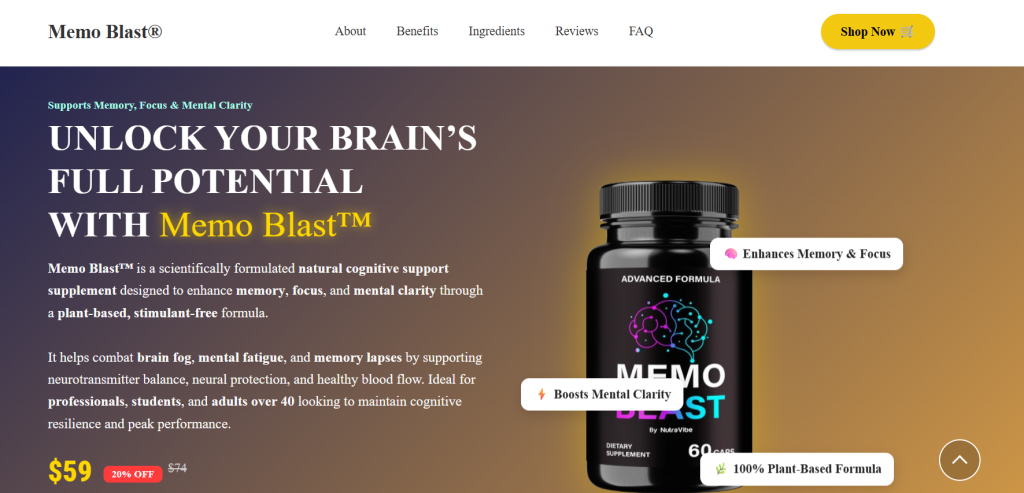If you’ve seen ads for MemoBlast, you’ve probably heard some pretty wild claims — things like:
👉 “It reverses memory loss!”
👉 “Clinically proven to cure Alzheimer’s!”
👉 “Backed by Harvard scientists!”
Sounds impressive, right? But here’s the truth — almost everything about MemoBlast’s marketing is fake.
In this in-depth MemoBlast review, let’s uncover what this product really is, how it lures victims with fake claims, and why you should stay far away from it.
🚨 What Is MemoBlast?
MemoBlast is promoted as a miracle brain supplement that supposedly restores memory, boosts focus, and reverses cognitive decline — even claiming to “cure” Alzheimer’s disease.
The product is said to be created by a Dr. Elizabeth Bennett from the University of Tokyo, using something they call an “elephant trick memory hack.”
That all sounds scientific and exotic… but here’s the catch — none of it is real.

🧠 The Fake Science Behind MemoBlast
The company claims MemoBlast is:
- “Clinically proven”
- “FDA approved”
- “Backed by Harvard”
All three are false.
Let’s break that down:
- Supplements are not FDA approved. The FDA only approves prescription drugs, not over-the-counter supplements.
- There are no published clinical studies supporting MemoBlast.
- There’s no record of any Dr. Elizabeth Bennett associated with the University of Tokyo or any research on this product.
The so-called “13-second elephant trick” is just a made-up marketing gimmick. There’s no scientific study or credible research that connects elephants to human memory restoration.
🎭 Fake Doctors, Fake Testimonials, Fake Everything
The ads for MemoBlast are designed to make you emotionally invested. They show:
- Serious-looking “doctors” in lab coats
- Tearful testimonials from “patients”
- Dramatic background music
- And even celebrity endorsements — claiming people like Elon Musk and Meryl Streep support it
But these are AI-generated faces, stock actors, and deepfake videos. None of those people actually endorse or even know about MemoBlast.
This tactic is called social proof manipulation, and it’s a common trick used in online scams to make fake products appear legitimate.
⚗️ What’s Actually Inside MemoBlast?
When you look beyond the flashy marketing, MemoBlast is just another generic nootropic supplement — meaning it contains ingredients commonly found in cheap “brain booster” pills online.
These ingredients might include:
- Ginkgo Biloba
- Bacopa Monnieri
- Alpha GPC
- Vitamin B6 and B12
While these compounds can slightly improve alertness or focus in some people, they won’t regrow brain cells, cure Alzheimer’s, or reverse memory loss.
In other words: you’re paying for an overhyped vitamin blend.
💸 The Shady Sales Funnel
The biggest giveaway that MemoBlast is a scam lies in how it’s sold.
Their sales process follows a classic scam pattern:
- Long emotional videos that make you fear losing your memory.
- Fake testimonials and “doctor” endorsements to build trust.
- Urgency tricks like “only 7 bottles left” or “discount ends tonight.”
- Money-back guarantee that rarely works — users report that refunds are ignored or delayed.
- Multiple websites with slightly different names (like memoblast-official.com, memoblaststore.com, etc.), making it impossible to trace the real company.
And when you look up the domain registration details, they’re often hidden using fake information, which is a massive red flag.
🕵️♂️ Real Users’ Complaints
People online have reported:
- Being charged multiple times for one order
- No way to contact customer service
- No refund, even with the “money-back guarantee”
- Receiving bottles without any verified manufacturer info
Many victims also mentioned phishing-style follow-up emails trying to sell more “brain miracle” products afterward — suggesting MemoBlast might be part of a larger scam network.
🧬 The Truth About Memory and Brain Health
Here’s the thing — no pill can reverse Alzheimer’s or regrow brain cells.
Brain health takes consistent lifestyle habits, not miracle supplements.
If you’re concerned about memory loss or cognitive decline, focus on:
✅ Balanced diet rich in omega-3s, antioxidants, and B vitamins
✅ Regular physical exercise
✅ Good sleep hygiene
✅ Stress management
✅ Consultation with a licensed neurologist or doctor
Supplements can sometimes support brain health, but they’re not a substitute for medical care.
⚠️ Final Verdict: MemoBlast Is a Scam
After analyzing all available information, it’s clear that MemoBlast is not a legitimate product.
Here’s why:
- ❌ Fake doctor and research claims
- ❌ Misleading “FDA approved” labeling
- ❌ AI-generated or fake testimonials
- ❌ Hidden company details
- ❌ False money-back guarantees
MemoBlast is just a rebranded nootropic supplement with exaggerated claims, designed to exploit vulnerable people looking for hope.
✅ Safe Alternatives for Brain Health
If you want real results, consider evidence-based nootropics or doctor-recommended supplements with transparent ingredients and verified studies.
Some trustworthy options include:
- Omega-3 fish oil (supports brain cell integrity)
- Lion’s Mane Mushroom (mild cognitive support)
- Phosphatidylserine (supports memory function)
And most importantly — buy only from reputable brands that show clinical studies, transparent manufacturing, and real customer service.
🧩 Final Thoughts
The internet is full of products like MemoBlast — flashy, emotional, and too good to be true.
Don’t let marketing manipulation and fake science fool you.
Always verify the doctor, check the research, and read independent reviews before trusting any “miracle brain pill.”
If something claims to “cure Alzheimer’s” or “regrow brain cells,” it’s not revolutionary — it’s a scam.

